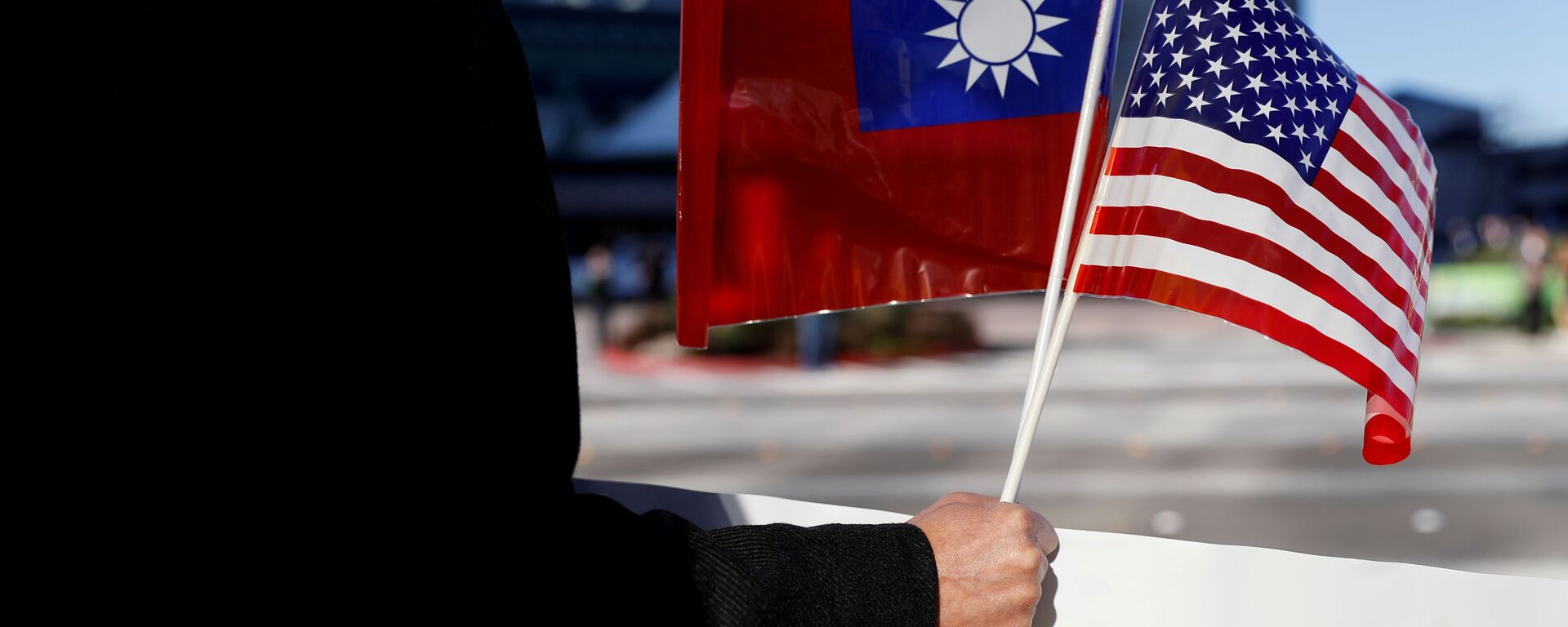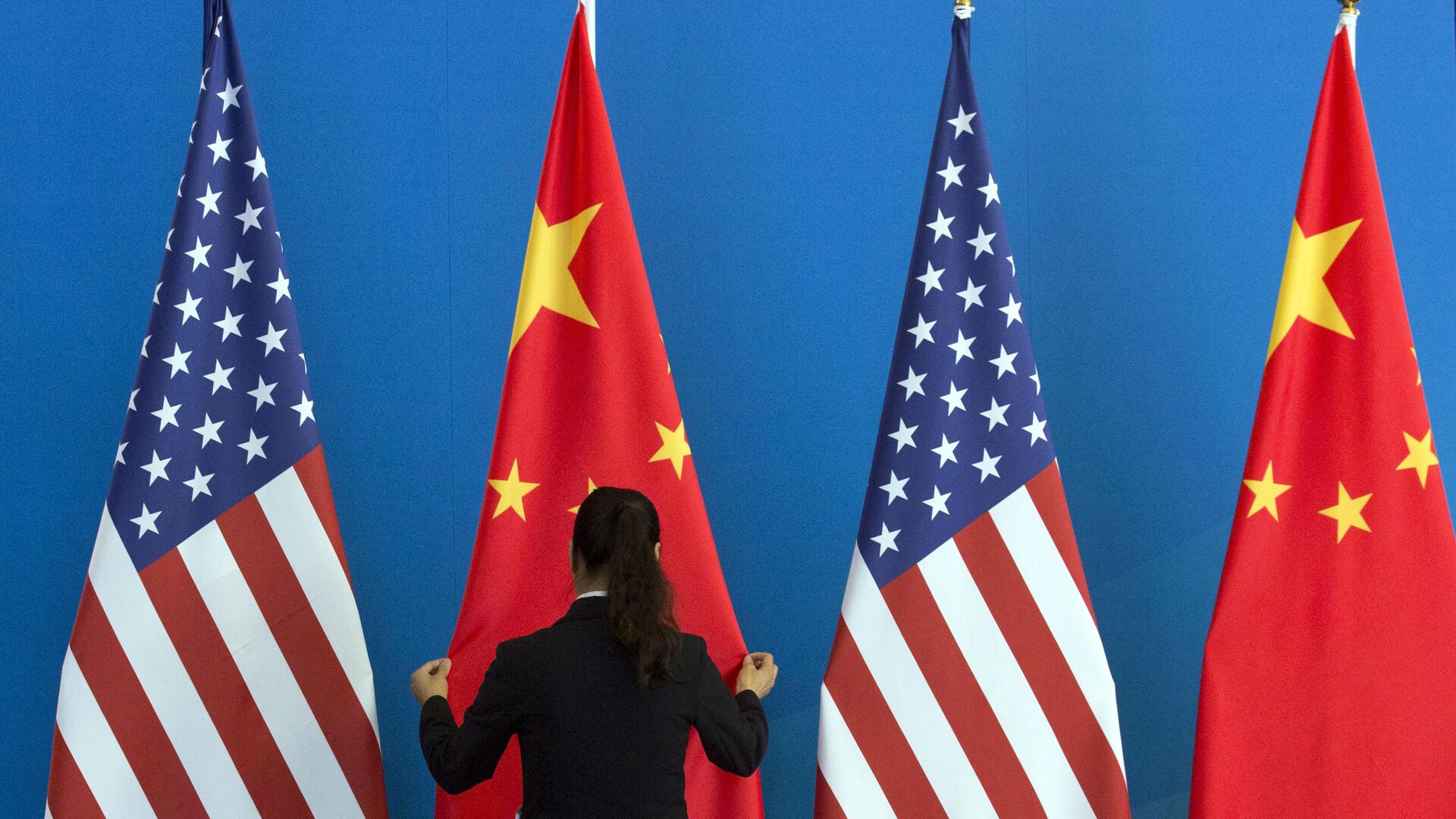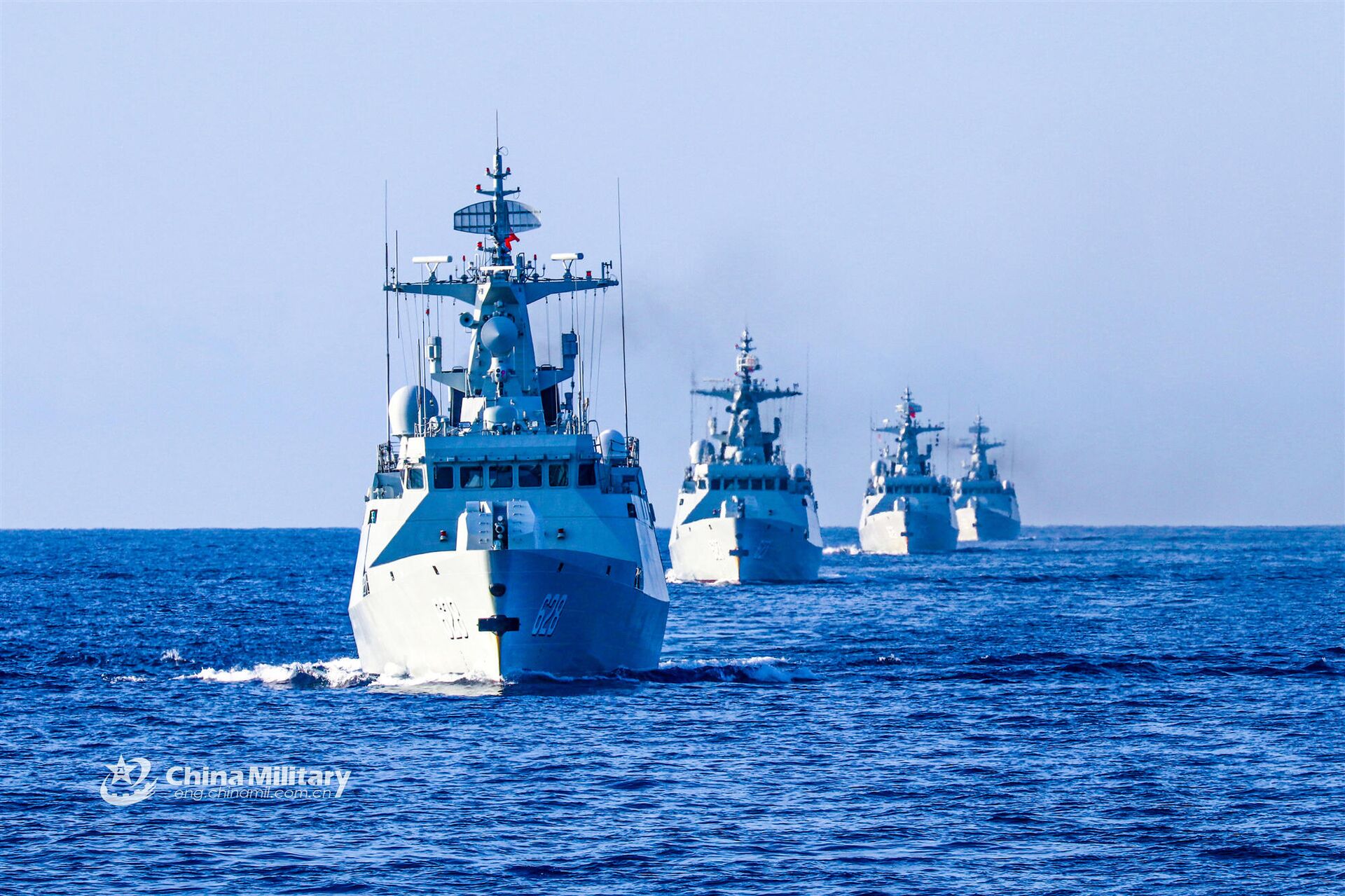https://sputnikglobe.com/20211009/how-could-reports-about-us-training-taiwanese-troops-affect-washington-beijing-relations-1089790375.html
How Could Reports About US Training Taiwanese Troops Affect Washington-Beijing Relations?
How Could Reports About US Training Taiwanese Troops Affect Washington-Beijing Relations?
Sputnik International
A Thursday report by The Wall Street Journal suggested that American soldiers have been secretly operating in Taiwan and training its army for at least a year... 09.10.2021, Sputnik International
2021-10-09T12:20+0000
2021-10-09T12:20+0000
2023-06-19T12:42+0000
us
china
military
us military
opinion
asia
taiwan
https://cdn1.img.sputnikglobe.com/img/07e5/01/12/1081799952_0:160:3073:1888_1920x0_80_0_0_9162f74d85eebf2ecaa044876a0419fe.jpg
The reported clandestine US military assistance to Taiwan, which is considered by China as a rebellious part of the mainland, has stirred debates on both social media and in political circles. While Beijing, according to the WSJ, has called on Washington to comply with prior agreements pertaining to Taiwan, the US urged China to end what it believes is economic "pressure" and "coercion" against the island.The outlet asserted that some two dozen US special operations and support troops have been training small units of Taiwan's ground forces. While there were no official comments from the US concerning The Wall Street Journal's allegations, State Department spokesperson Ned Price in a Thursday remark said that the American commitment to Taiwan remains "rock-solid" as it "contributes [...] to the maintenance of peace and stability across the Taiwan Strait and within the broader region as well".The feedback on the WSJ report was diverse, with some expressing outrage over the alleged "invasion" by the US, and others questioning the claims, particularly the number of American troops and the secrecy.Some, however, pointed out that the timing of the report is "interesting", given that it emerged right after the conversation between US President Joe Biden and his Chinese counterpart Xi Jinping, in which Biden reiterated America's commitment to the aforementioned Taiwan-related agreements.Dr Victor Teo, a project research fellow with the Beyond the Cold War & Asian Regionalism project based at the Centre for Research in the Arts, Social Sciences, and Humanities at the University of Cambridge, suggested that the speculations might be a message for both China and Taiwan."The call is a direct assurance to China that the US has not changed its position on the 'One China' policy. However, in view of Taiwan's concerns, as well as the looming mid-term Congressional elections in November, this news leakage of US Special Forces in Taiwan sends a message to everyone concerned that the US is still keen on helping Taiwan defend itself in the event the Chinese try to reunify Taiwan by force", Teo explained, pondering the goal of the report. "This leaks helps ameliorate those who might be enraged by the news that the Biden administration is not taking a harder line against China instead".Others argued that the subject of the report itself is questionable and somewhat obsolete, given that this is not the first time similar speculations have emerged. Dismissing The Wall Street Journal report as nothing but an "old rumour", Dr Chang Ching, research fellow from the Taiwan-based Society for Strategic Studies and a lead military expert on the People's Liberation Army and regional security in Taiwan, pointed at a resemblance to the situation in the Philippines as President Duterte suspended the Visiting Force Agreement that guaranteed United States military personnel judicial immunity when they engage in joint exercises and training programmes in the Asian country.Ching noted a lack of evidence to substantiate the claims about clandestine US military operations in Taiwan and recalled that Taipei has not granted judicial immunity to American military personnel since 1979 - a privilege that is required by the US Congress to allow any military deployment to foreign countries.When examining the possible motivation behind the claims, Ching suggested that resurfacing "old rumours" may be an attempt to undermine the efforts to stabilise relations between Washington and Beijing.What to Expect From Beijing?Given that bilateral relations between the United States and the People's Republic of China aren't exactly at a high point, Beijing will be "careful" in its response to Washington but at the same time will not give up on its Taiwan stance, according to Teo."At a minimum, we can expect strong political statements and diplomatic protests from China. Beijing would also likely keep its military pressure on Taiwan as it cannot be seen in any manner to be compromising on its sovereignty", he suggested. "It would, however, be careful as well as it does not wish for relations with the United States to get any worse".A similar sentiment, according to Teo, is shared by the Biden administration, since it is keen to ensure that Sino-American relations remain stable, and not escalate into a war.Ching also predicted the reiteration of Beijing's "bottom lines" and official positions, but argued that "nothing will actually happen".Taiwanese Concerns About Chinese 'Attack'On Wednesday, Taiwanese Defence Minister Chiu Kuo-cheng claimed that Beijing might launch a full-scale attack on the island by 2025, with minimal losses. The claims were voiced amid heated tensions in the South China Sea, where China sent about 150 military aircraft close to Taiwan in the wake of the US and its allies conducting military drills in the region.As the situation in the Asian region continues to be a cause for concern for Washington and Taipei, the Chinese president stated on Friday that "the reunification of the motherland by peaceful means is most in line with the overall interests of the Chinese nation, including our compatriots in Taiwan".While Biden assured that the US adheres to the "One China - Two Systems" policy that Beijing follows with regard to Taiwan, Washington still refers to its commitments under the 1979 Taiwan Relations Act which envisages the US helping the island with its defence efforts should Beijing attempt to reunify it by force. And, according to Dr Teo, the US military operations in the region "should not come as a surprise, given that the Taiwanese and United States have always had military exchanges".Commenting on the capabilities of the Taiwanese Army, Teo said they "cannot be taken for granted". When elaborating on an unwitting comparison to the Afghan Army - which was also trained by the United States with the results widely known - he said that the Taiwanese military is "very different".
https://sputnikglobe.com/20211007/chinese-journo-denounces-us-invaders-amid-news-of-secret-special-forces-training-on-taiwan-1089749963.html
china
taiwan
Sputnik International
feedback@sputniknews.com
+74956456601
MIA „Rosiya Segodnya“
2021
News
en_EN
Sputnik International
feedback@sputniknews.com
+74956456601
MIA „Rosiya Segodnya“
Sputnik International
feedback@sputniknews.com
+74956456601
MIA „Rosiya Segodnya“
us, china, us military, opinion, taiwan
us, china, us military, opinion, taiwan
How Could Reports About US Training Taiwanese Troops Affect Washington-Beijing Relations?
12:20 GMT 09.10.2021 (Updated: 12:42 GMT 19.06.2023) A Thursday report by The Wall Street Journal suggested that American soldiers have been secretly operating in Taiwan and training its army for at least a year under the pretext of precautions against potential Chinese aggression in the region.
The reported clandestine US military assistance to Taiwan, which is considered by China as a rebellious part of the mainland, has stirred debates on both social media and in political circles. While Beijing,
according to the WSJ, has called on Washington to comply with prior agreements pertaining to Taiwan, the US urged China to end what it believes is economic "pressure" and "coercion" against the island.
The outlet asserted that some two dozen US special operations and support troops have been training small units of Taiwan's ground forces. While there were no official comments from the US concerning
The Wall Street Journal's allegations, State Department spokesperson Ned Price in a Thursday remark said that the American commitment to Taiwan
remains "rock-solid" as it "contributes [...] to the maintenance of peace and stability across the Taiwan Strait and within the broader region as well".
The feedback on the WSJ report was diverse, with some expressing outrage over the alleged "invasion" by the US, and others questioning the claims, particularly the number of American troops and the secrecy.

7 October 2021, 19:57 GMT
Some, however, pointed out that the timing of the report is "interesting", given that it emerged right after the conversation between US President Joe Biden and his Chinese counterpart Xi Jinping, in which Biden reiterated America's commitment to the aforementioned Taiwan-related agreements.
Dr Victor Teo, a project research fellow with the Beyond the Cold War & Asian Regionalism project based at the Centre for Research in the Arts, Social Sciences, and Humanities at the University of Cambridge, suggested that the speculations might be a message for both China and Taiwan.
"The call is a direct assurance to China that the US has not changed its position on the 'One China' policy. However, in view of Taiwan's concerns, as well as the looming mid-term Congressional elections in November, this news leakage of US Special Forces in Taiwan sends a message to everyone concerned that the US is still keen on helping Taiwan defend itself in the event the Chinese try to reunify Taiwan by force", Teo explained, pondering the goal of the report. "This leaks helps ameliorate those who might be enraged by the news that the Biden administration is not taking a harder line against China instead".
Others argued that the subject of the report itself is questionable and somewhat obsolete, given that this is not the first time similar speculations have emerged. Dismissing The Wall Street Journal report as nothing but an "old rumour", Dr Chang Ching, research fellow from the Taiwan-based Society for Strategic Studies and a lead military expert on the People's Liberation Army and regional security in Taiwan, pointed at a resemblance to the situation in the Philippines as President Duterte suspended the Visiting Force Agreement that guaranteed United States military personnel judicial immunity when they engage in joint exercises and training programmes in the Asian country.
"How serious did the Pentagon react then? Why did Secretary Austin need to address this issue so eagerly during his visit to Manila? No judicial immunity, no US military deployment, it is a crystal clear issue", Ching insisted.
Ching noted a lack of evidence to substantiate the claims about clandestine US military operations in Taiwan and recalled that Taipei has not granted judicial immunity to American military personnel since 1979 - a privilege that is required by the US Congress to allow any military deployment to foreign countries.
When examining the possible motivation behind the claims, Ching suggested that resurfacing "old rumours" may be an attempt to undermine the efforts to stabilise relations between Washington and Beijing.
"[...] Playing a cheap rumour like this is a typical scheme to undermine the attempt paid by the Biden administration to rebuild a more constructive relationship with Beijing", the military expert asserted.
What to Expect From Beijing?
Given that bilateral relations between the United States and the People's Republic of China aren't exactly at a high point, Beijing will be "careful" in its response to Washington but at the same time will not give up on its Taiwan stance, according to Teo.
"At a minimum, we can expect strong political statements and diplomatic protests from China. Beijing would also likely keep its military pressure on Taiwan as it cannot be seen in any manner to be compromising on its sovereignty", he suggested. "It would, however, be careful as well as it does not wish for relations with the United States to get any worse".
A similar sentiment, according to Teo, is shared by the Biden administration, since it is keen to ensure that Sino-American relations remain stable, and not escalate into a war.
Ching also predicted the reiteration of Beijing's "bottom lines" and official positions, but argued that "nothing will actually happen".
"Beijing will treat this as a joke", he asserted. "[It] clearly knows the level of the anxiety in Washington to solve the economic[ally] embarrassing deadlock with Beijing. Washington has no interest in letting rumours like this disrupt its urgent agenda".
Taiwanese Concerns About Chinese 'Attack'
On Wednesday, Taiwanese Defence Minister Chiu Kuo-cheng claimed that Beijing might launch a full-scale attack on the island by 2025, with minimal losses. The claims were voiced amid heated tensions in the South China Sea, where China sent about 150 military aircraft close to Taiwan in the wake of the US and its allies conducting military drills in the region.
As the situation in the Asian region continues to be a cause for concern for Washington and Taipei, the Chinese president
stated on Friday that "the reunification of the motherland by peaceful means is most in line with the overall interests of the Chinese nation, including our compatriots in Taiwan".
While Biden assured that the US adheres to the "One China - Two Systems" policy that Beijing follows with regard to Taiwan, Washington still refers to its commitments under the 1979 Taiwan Relations Act which envisages the US helping the island with its defence efforts should Beijing attempt to reunify it by force. And, according to Dr Teo, the US military operations in the region "should not come as a surprise, given that the Taiwanese and United States have always had military exchanges".
Commenting on the capabilities of the Taiwanese Army, Teo said they "cannot be taken for granted". When elaborating on an unwitting comparison to the Afghan Army - which was also trained by the United States with the results widely known - he said that the Taiwanese military is "very different".
"It is a formidable one, and even though it is unlikely to be able to stop the PLA today – it would prove to be very difficult for China just to walk over without a fight", Teo said. "Beyond that, its forces will work closely with the US and its allies in times of a conflict".






